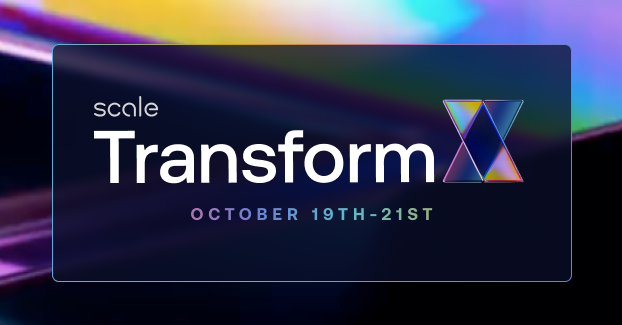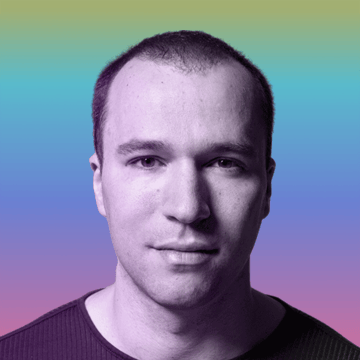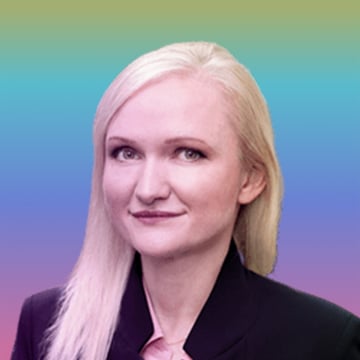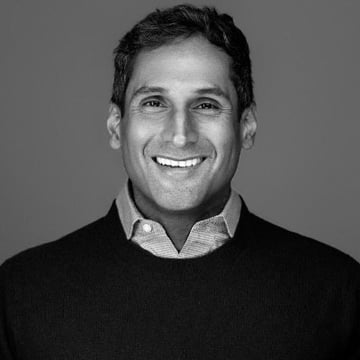
LIVESTREAM
Scale TransformX
# TransformX 2022
TransformX Conference: Operationalizing AI at Scale
Join Scale AI as we bring together over 120 of the world's brightest AI leaders, visionaries, practitioners, and researchers across industries to explore operationalizing AI and Machine Learning.
This year's conference will bring together 30,000 AI leaders and practitioners and feature three days of in-person and virtual keynote presentations, fireside chats, expert panel discussions, and hands-on workshops.
Speakers
Alexandr Wang
CEO & Founder @ Scale AI
Eric Schmidt
Co-Founder, Schmidt Futures; Former CEO & Chairman, Google @ Schmidt Futures
Mike Schroepfer
Senior Fellow & Former CTO @ Meta
Thomas Kurian
CEO @ Google Cloud
Daphne Koller
CEO & Founder @ insitro
Greg Brockman
President, Chairman, and Founder @ OpenAI
Jeff Wilke
Chairman and co-founder @ Re:Build Manufacturing and Retired CEO @ Amazon's Worldwide Consumer
Laura Major
CTO @ Motional
Koray Kavukcuoglu
Vice President of Research and Technology @ DeepMind
François Chollet
Author of Keras @ Google
Nat Friedman
Former CEO @ GitHub
James Manyika
Senior Vice President for Technology & Society @ Google
Lila Tretikov
Corporate Vice President/Deputy Chief Technology Officer @ Microsoft
Pieter Abbeel
Director of the Berkeley Robot Learning Lab and Co-Director of the Berkeley Artificial Intelligence (BAIR) Lab @ UC Berkeley and Covariant
Emad Mostaque
Founder & CEO @ Stability AI
Bradley Horowitz
Vice President & Advisor @ Google
Neda Cvijetic
Senior Vice President – Head of Artificial Intelligence and Autonomous Driving (AD) @ Stellantis
Dr. Craig Martell
DoD Chief Digital and AI Officer @ Chief Digital and Artificial Intelligence Office (CDAO)
John List
Kenneth C. Griffin Distinguished Service Professor in Economics @ University of Chicago
Admiral William H. McRaven
Senior Advisor @ Lazard Financial Advisory
Dr. Lynne Parker
Associate Vice Chancellor; Director of the AI Tennessee Initiative @ University of Tennessee Knoxville
Sir Jeremy Fleming
Director @ GCHQ
Michael I. Jordan
Pehong Chen Distinguished Professor in the EECS Department and the Department of Statistics @ University of California, Berkeley
Tim Ellis
Co-Founder and Chief Executive Officer @ Relativity Space
Dr. Kenneth E. Washington
VP Software Engineering, Consumer Robotics @ Amazon
Mike Fisher
CTO @ Etsy
Daniele Perito
Co-founder and Chief Data Officer @ Faire
Ian Bremmer
President and Founder @ Eurasia Group
Anima Anandkumar
Director of ML Research @ NVIDIA
Brandon Moak
Co-founder & Chief Technology Officer @ Embark Trucks
Boris Sofman
Head of Engineering for Trucking @ Waymo Via
Richard Socher
CEO @ you.com
Aidan Gomez
Cofounder & CEO @ Cohere
Dragomir Anguelov
Distinguished Scientist and Head of Research @ Waymo
Curtis Huang
Head of Content Understanding @ Snap
Glenn Hofmann
Chief Analytics Officer | Data Science & Artificial Intelligence Expertise | Large Teams Leadership @ New York Life Insurance Company
John Hinshaw
Group Chief Operating Officer @ HSBC
Jason Matheny
President and Chief Executive Officer @ RAND Corporation
Dr. Will Roper
Distinguished Professor @ Georgia Tech
Dr. Jane Pinelis
Chief AI Engineer @ The Johns Hopkins University Applied Physics Laboratory
Michael Kratsios
Managing Director, 4th CTO, United States @ Scale AI
John Dulin
CEO and Co-Founder @ Modern Intelligence
Stephanie Halcrow
Senior Fellow; President, The Halcrow Group @ George Mason University’s Center for Government Contracting
Dan Patt
Senior Fellow, Center for Defense Concepts and Technology; Executive Partner, THL Partners @ Hudson Institut
Emily Harding
Deputy Director and Senior Fellow, International Security Program @ CSIS
Alex Kendall
CEO @ Wayve
Jordan Fisher
CEO and Founder @ Standard AI
Lee Hudson
Defense Reporter @ POLITICO
Nadia Fawaz
Senior Staff Applied Research Scientist & Tech Lead Inclusive AI @ Pinterest
Nathan Silberman
Formerly, VP of AI at PathAI, Butterfly @ ML Executive
Navrina Singh
Founder and CEO @ Credo AI
Nick Beighton
Former CEO @ ASOS
Shiva Rajaraman
VP Product @ OpenSea
Sriram Raghavan
Vice President @ IBM Research AI
Vilas Dhar
President and Trustee @ Patrick J. McGovern Foundation
Alan Cowen
Chief Scientist and CEO @ Hume AI
John Maeda
CTO @ Everbridge
Rong Yan
CTO @ Verishop
Saad Ahmed
Managing Director - Merchants & Commercial @ Grab
Tony Jebara
Head of Machine Learning and VP of Engineering at Spotify @ Spotify
Dileep Thazhmon
Founder & CEO @ Jeeves
Henrique Dubugras
Co-Founder & Co-CEO @ Brex
Miriam Cha
Research Scientist, Artificial Intelligence Technology Group @ MIT Lincoln Library
Ariana Eisenstein
CTO @ Pickle Robot
Jack Guo
Head of Autonomy Platform @ Nuro
Mostafa Rohaninejad
Founding Research Scientist @ Covariant
Eric Rachlin
Former Cofounder & CTO @ Body Labs
Natalya Tatarchuk
Distinguished Technical Fellow and Chief Architect, VP, Professional Artistry & Graphics Innovation @ Unity
Paul Lekas
Senior Vice President, Global Public Policy @ SIIA
Bryan Catanzaro
Vice President, Applied Deep Learning Research @ NVIDIA
Oleksandr Paraska
CTO @ Togal.ai, Admissions @ Tribe AI
Marco Pavone
Director, Autonomous Vehicle Research, Associate Professor at Stanford University @ NVIDIA
Tom Vu
Senior Director and Head of Data Science and Machine Learning @ Flexport
Faisal Siddiqi
Director Machine Learning Platform @ Netflix
David Ha
Research Scientist @ Google Brain
Kate Park
Staff AI Product Manager @ Tesla
Dan Shiebler
Head of Machine Learning @ Abnormal Security
Varun Mohan
CEO and Co-Founder @ Exafunction
Susan Zhang
Research Engineer @ Meta AI
Arvind Neelakantan
Research Lead & Manager @ OpenAI
Louis Tremblay
AI/ML Engineering Leader @ Resideo
Vijay Karunamurthy
Field CTO @ Scale AI
Mark Valentine
Head of Federal @ Scale AI and Formerly, General Manager, National Security @ Microsoft
Jon Wilfong
SVP of Sales & Field Operations @ Scale AI
Russell Kaplan
Director of Engineering @ Scale AI
Elliot Branson
Director of Machine Learning and Engineering @ Scale AI
Vivek Muppalla
Director of Synthetic Systems @ Scale AI
Julia de Boinville
Head of UK @ Scale AI
Yuting Duan
Head of Content Understanding @ Scale AI
Aatish Nayak
Head of Catalog @ Scale AI
Melisa Tokmak
GM, Document AI @ Scale AI
Mohammed Husain
Solutions Engineer @ Scale AI
Dean Shu
Head of Scale Studio @ Scale AI
Nick Semansky
Product Manager @ Scale AI
Lauren Oh
Product Manager @ Scale AI
Jason Liang
Product Manager @ Scale AI
Shah Xia
Head of Rapid @ Scale AI
Tim Lu
Product Manager @ Scale AI
Bihan Jiang
Product Manager @ Scale AI
Ben Levin
Lead Product Manager @ Scale AI
Mahesh Murag
Product Manager @ Scale AI
Jessica Zhu
Software Engineer @ Scale AI
AJ Ostrow
Software Engineer @ Scale AI
Osvald Nitski
Strategic Product Manager @ Scale AI
Austin Russell
Founder & CEO @ Luminar
Gerrit De Vynck
Tech Reporter @ The Washington Post
Vivek Muppalla
Director of Engineering @ Scale AI
Erhan Bas
Machine Learning Engineer @ Scale AI
Agenda
Day 1 - Virtual and In-PersonDay 2 - VirtualDay 3 - Virtual
Track View
From3:00 PM
To4:00 PM
GMT
Tags:
Stage 1
1:1 networking
Networking
+ Read More
From4:00 PM
To4:30 PM
GMT
Tags:
Stage 1
Opening / Closing
Opening Remarks with Alexandr Wang, CEO & Founder of Scale AI
Speakers:

From4:30 PM
To5:15 PM
GMT
Tags:
Stage 1
Fireside Chat
The Future of Foundation, Large Language, and Generative Models
+ Read More
Speakers:



From5:15 PM
To5:45 PM
GMT
Tags:
Stage 1
Fireside Chat
The State of AI Adoption with Thomas Kurian, CEO of Google Cloud
+ Read More
Speakers:



From5:45 PM
To6:15 PM
GMT
Tags:
Stage 1
Keynote
Applying AI to Redefine Every Industry
+ Read More
Speakers:

From6:15 PM
To6:45 PM
GMT
Tags:
Stage 1
Fireside Chat
Ushering the Next Generation of Transportation
+ Read More
Speakers:



From6:45 PM
To7:45 PM
GMT
Tags:
Stage 1
1:1 networking
Morning Networking Break
From7:45 PM
To8:15 PM
GMT
Tags:
Stage 1
Keynote
Transforming Drug Discovery Using Digital Biology
+ Read More
Speakers:

From8:15 PM
To9:00 PM
GMT
Tags:
Stage 1
Fireside Chat
Navigating an AI-Enabled Future with Eric Schmidt
+ Read More
Speakers:





From9:00 PM
To9:30 PM
GMT
Tags:
Stage 1
Fireside Chat
Building AI-Native Products and What’s Next For AI
+ Read More
Speakers:



From9:30 PM
To10:00 PM
GMT
Tags:
Stage 1
Fireside Chat
Accelerating the Pace of AI for National Security
+ Read More
Speakers:



From10:00 PM
To10:30 PM
GMT
Tags:
Stage 1
Fireside Chat
Redefining and Empowering Humanity in the Age of AI
+ Read More
Speakers:



From10:30 PM
To11:15 PM
GMT
Tags:
Stage 1
1:1 networking
Afternoon Networking Break
From11:15 PM
To11:45 PM
GMT
Tags:
Stage 1
Fireside Chat
Designing Customer-Centric Autonomy at Million-Vehicle Scale
+ Read More
Speakers:



From11:45 PM
To12:15 AM+1
GMT
Tags:
Stage 1
Fireside Chat
A Vision for Advancing the Democratization of AI
+ Read More
Speakers:



From12:15 AM +1
To12:30 AM+1
GMT
Tags:
Stage 1
Opening / Closing
Closing Remarks with Alexandr Wang, CEO & Founder of Scale AI
Speakers:

Event has finished
October 19, 4:00 PM GMT
Online
Event has finished
October 19, 4:00 PM GMT
Online












































































































